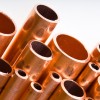Is Copper Magnetic? Neodymium Magnet and Copper Tube Experiment
Cobalt, iron, and nickel are all magnetic. But is copper magnetic? Technically, no. Though copper is not magnetic, you can still do some pretty cool experiments with strong magnets and copper! If you don't believe it, just give "copper and magnets" a quick search on YouTube or Google.
To experience how copper and magnets interact for yourself, we have an easy magnetic experiment for you!
What You’ll Need:
- A copper tube
- Strong neodymium bar magnet— we’d suggest something like a ½” x ⅛” x ⅛” bar
- First, test how the magnet would fall in a normal environment by dropping your bar magnet from hand to hand. Be careful not to drop the magnet at a high distance or onto a hard surface, though, as magnets can possibly shatter from impact if dropped at the right speed or height.
- Observe the magnet as you drop it a few times. You should notice that because of gravity, the magnet falls fairly fast.
- Now, pick up the copper tube and hold it vertically with the open ends facing up and down.
- Drop your bar magnet down the tube, being sure to catch it at the bottom.
- Notice that the magnet falls much slower down the tube than in steps 1 & 2.

